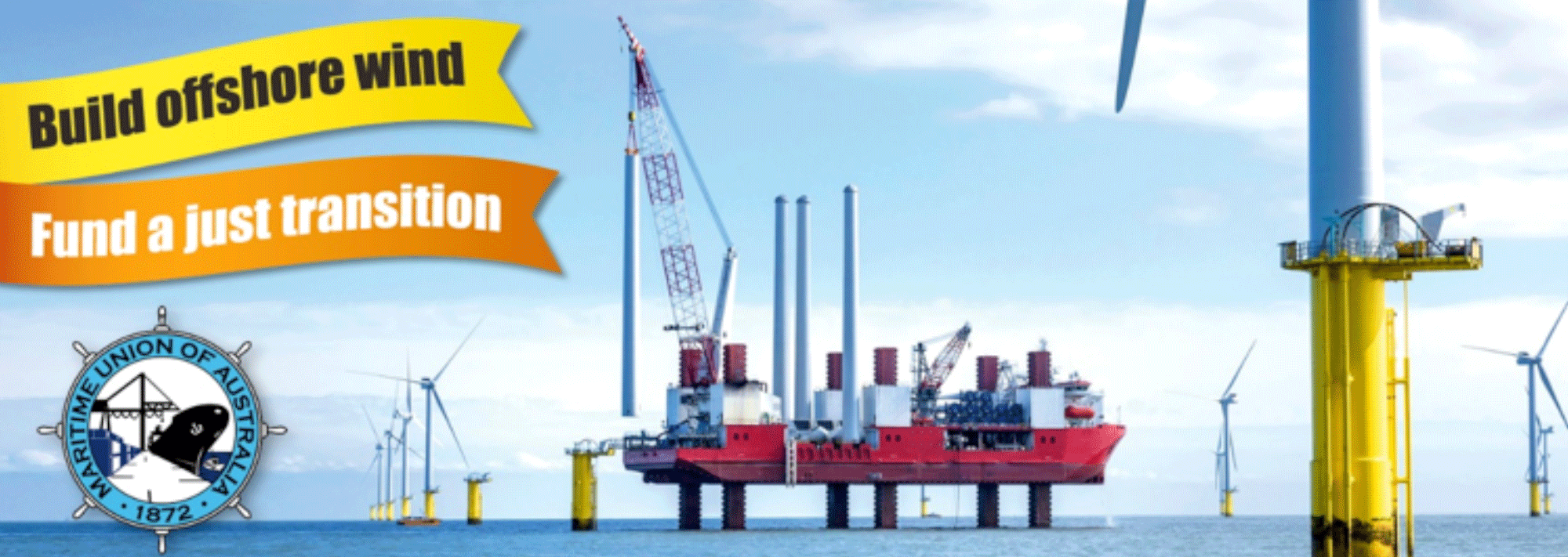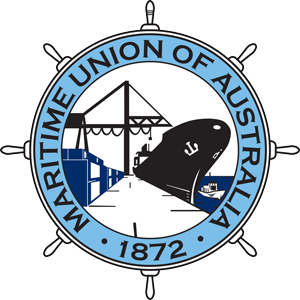
The MUA is campaigning to establish an offshore wind industry to generate electricity for Australian households and industry, and to ensure that the government funds a just transition for maritime workers and all workers and communities that rely on the oil, gas and coal industries. We need significant investment and we need to ensure that we have good union jobs to go to in the low-emissions industries that are already being built.
Offshore wind farms could be an excellent source of electricity and jobs for seafarers and port workers. If ships were required to plug into electricity in port it would improve air quality in ports and in the community, and increase jobs. The government needs to invest in developing new zero-emissions ships using hydrogen. A new hydrogen industry could use renewable energy to power zero-emissions industry and transport, and create manufacturing in Australia that was lost when oil refineries were shut down.
Implementing any programs like this will require a huge struggle. We need to force the government to make the investments we need, funded through taxes on big corporations who are responsible for the current ecological crisis.
The climate crisis
Unprecedented temperatures across the world this year are driving intense bushfires, water shortages, destructive hurricanes, drying rivers, melting ice caps and rising sea levels that are already displacing millions of people each year. Pacific and Torres Strait Island communities are being flooded and many remote Indigenous communities suffered unbearable temperatures and water shortages last summer.
Scientists say that global heating must be kept to 1.5°C below pre-industrial levels in order to avoid catastrophic, irreversible changes in the earth’s climate system. Even at 1.5°C, between 70-90% of coral reefs will be lost will be lost with devastating impacts on marine life across the world.
Average temperatures have increased by 1°C in the past century. Emissions in Australia and globally continue to increase, and with current expansion of fossil fuel use the world is on track for a 3.7 to 5°C increase.
The world needs to move to zero net carbon emissions by about 2050, and halve carbon emissions each decade.
The MUA’s climate change and renewable energy policy is here.
Other climate and renewable energy policy and submissions are here.
What about workers in fossil fuel industries?
Many MUA members work as seafarers supplying the offshore oil and gas industry. We are part of the Offshore Alliance successfully organising workers and improving conditions in the offshore oil and gas industry. We work in Newcastle’s coal terminals and as port and tug workers in coal export ports in NSW and Queensland.
The MUA is committed to ensuring that jobs and conditions are maintained for members in any transition to reduce greenhouse gas emissions. We will be best placed to secure strong union agreements in future industries if we are a respected part of a big social movement campaigning for these new jobs and industries. We will be able to secure more government investment and support and better protections for workers if a transition can be properly planned with plenty of notice.
A good example is New York State. Unions formed a ‘Climate Jobs NY’ campaign and the state government has committed to build 9,000 MW of offshore wind, and to require union agreements and local procurement on those projects.
In Queensland the ETU successfully campaigned for the state government to establish a new public renewable energy generator called CleanCo. Any employees transferring to CleanCo from existing state-owned generators CS Energy or Stanwell will maintain their existing conditions, including no forced redundancies or relocations, and any new CleanCo employees will also be on the same terms and conditions.
In Germany, a special Commission, including the union IG BC, has recommended phasing out coal-fired power and brown coal mines by 2038, but conditional on the creation of quality jobs and clear transition pathways for workers. The plan includes a job guarantee with no forced redundancy for any worker and €40 billion over 20 years for regional development, including infrastructure and rehabilitation of mining areas and plants.
Sign a petition to support our campaign.
Read more about building offshore wind in Australia here.
MUA submission on offshore renewable energy legislation
The government introduced the Offshore Electricity Infrastructure Bill to Parliament on 2 September, and it has been sent to a Senate inquiry.
The MUA has made a submission to the Inquiry, and appeared at the public hearing on Friday 1 October. The inquiry will report back to Parliament on 14 October.
The Bill would allow the government to declare large Offshore Electricity Areas. The many offshore wind projects now proposed around Australia could then apply for a feasibility licence to survey the wind resources within those areas, and then a commercial operating licence to build wind turbines, substations, and transmission cables back to shore.
Without this legislation, no offshore wind projects can proceed.
The MUA and ETU have been working to achieve the best possible outcomes for this legislation, and to ensure that other organisations understand our issues and concerns. Our three main concerns with the legislation are:
- WHS issues. While it is good news that the harmonised WHS Act will apply to work within offshore wind licenced areas, including on vessels, the proposed Bill removes many important aspects of the WHS Act (details in our submission. Unions are seeking to ensure that WHS provisions are not un-harmonised with the national WHS system, and that coverage is clear and consistent. The Bill makes NOPSEMA the regulator for WHS, environment, and infrastructure integrity.
- Ensuring Offshore Electricity Areas are declared in a timely fashion. The Bill allows the Commonwealth Energy Minister to ‘declare’ an area to be suitable for offshore renewable energy, after consultation. However, there is no indication of why the Minster would start this process, or timeframe on when they would complete it. We are advocating for developers, state governments, and electricity planning agencies to be able to put a request to the Minister to start the declaration process, and for a timeframe to be introduced on when the Minister must complete it.
- Provisions for jobs, manufacturing, a just transition and First Nations benefits must be added to the Merit Criteria for project Licences. This would include requiring Australian ships and making them Regulated Australian Vessels with Navigation Act qualifications. Unfortunately, no such criteria are included in the current Bill.
We are hoping that some of these issues can be addressed before the Bill is passed. However, it is also important that the Bill be passed before Parliament ends on 2 December, so that it does not get delayed until after an election.
The MUA is also seeking to ensure the Report of the Inquiry will set out actions to be undertaken by future Parliaments to fix any remaining WHS, jobs, and First Nations issues, to ensure that emissions reduction is a priority, and to create clear targets for large-scale construction of offshore renewables. An industry package including research, development, support for manufacturing hubs and skills training is needed alongside the Bill to support the development of offshore wind in Australia.
The MUA, ETU Submission is HERE
Watch MUA, ETU and ACTU officials at the Senate Inquiry Here
https://www.youtube.com/watch?v=vb8bwFBVvvM&t=1s

